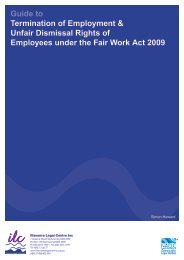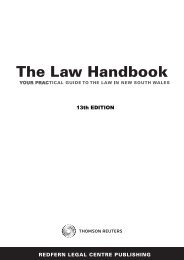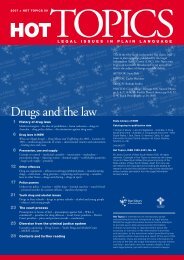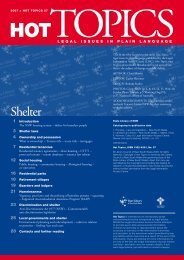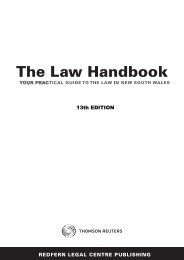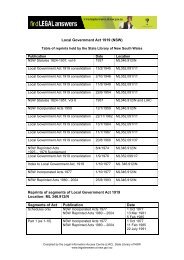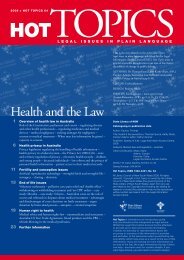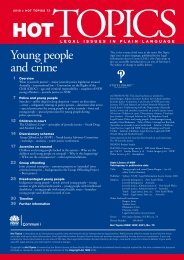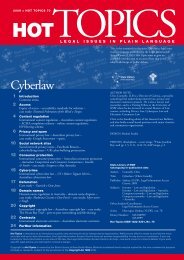Consumers | The law handbook - Legal Information Access Centre
Consumers | The law handbook - Legal Information Access Centre
Consumers | The law handbook - Legal Information Access Centre
- No tags were found...
You also want an ePaper? Increase the reach of your titles
YUMPU automatically turns print PDFs into web optimized ePapers that Google loves.
352 <strong>The</strong> Law Handbookthat are represented as being able to becarried out from a person’s home.Division 2 of Part 3-1 deals with the supplyof unsolicited goods and services. <strong>The</strong>recannot be a demand for payment for theprovision of unsolicited goods or servicesunless there is a reasonable belief that thereis a right to receive payment. <strong>The</strong> burden ofproof rests on the person who makes theunsolicited supply. A person who receivesunsolicited goods must permit a supplier torecover possession within a three-monthperiod, but if there is no attempt at recovery,the goods become those of the recipient atthe end of that period, and there can be nodemand for payment.Division 3 covers pyramid sales. <strong>The</strong>re isan absolute prohibition on these schemes.Division 4 deals with multiple pricing. Ifthere is more than one displayed price forgoods, the sale must be made at the lowestprice shown.Division 5 deals with other unfairpractices.Section 49 prohibits referral selling. Thatis, inducing a sale by promising that thepurchaser will receive a benefit in return forsupplying the names of other prospectivepurchasers, or otherwise assisting the sellerto supply goods or services, if the benefit iscontingent on an event occurring after thesale is made. An example would be where aseller induces a customer to purchase productsby offering a discount or rebate inreturn for the name of another prospectivepurchaser, but the rebate is only payable ifthe prospective purchaser named by thecustomer also makes a purchase down thetrack.Section 50 prohibits the use of physicalforce, or undue harassment or coercion, inconnection with the supply, or possiblesupply, or payment for, goods or services oran interest in land.[11.70] Consumer guaranteesDivision 1 of Pt. 3-2 sets out a number ofguarantees which are implied into transactionswith consumers. <strong>The</strong> concept of “consumer”is complex. However, broadlyspeaking a person will be taken to haveacquired goods or services as a consumerwhere either the goods or services suppliedare of a kind ordinarily acquired forpersonal, domestic or household use orconsumption, or where the contract pricedoes not exceed $40,000.<strong>The</strong> majority of the consumer guaranteesapply only to supplies made in trade orcommerce.<strong>The</strong> guarantees include:• s 51: Guarantee as to title• s 52: Guarantee as to undisturbedpossession• s 53: Guarantee that goods are free fromundisclosed securities• s 54: Guarantee as to acceptable quality• s 55: Guarantee as to fitness of goods forany disclosed purpose• s 56: Guarantee that goods supplied bydescription will correspond with thedescription• s 57: Guarantees in relation to goodssupplied by reference to a sample ordemonstration model, including that thegoods will correspond with the sample ordemonstration model in quality, state orcondition• s 58: Guarantee as to availability ofrepairs and spare parts• s 59: Guarantee that there will be compliancewith any express warranties givenor made by the manufacturer or supplierof goods• s 60: Guarantee that services will berendered with due care and skill• s 61: Guarantees as to fitness of servicesfor any disclosed purpose• s 62: Guarantee that services will besupplied within a reasonable time (unlessthe time for supply is fixed by contract oris to be determined in a manner agreed toby the supplier and the consumer).<strong>The</strong>se guarantees cannot be excluded orlimited by contract (see s 64). However,there are some special allowances for recreationalservice providers and also someexclusions to the general provisions. <strong>The</strong>guarantees do not apply to goods purchasedfor resupply. Thus, if a retailer purchasesgoods of a type normally used for personal,household or domestic purposes, the retaileris not considered a consumer and the





